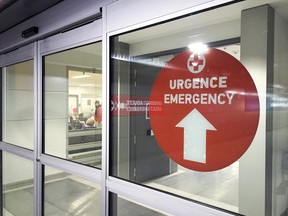Quebec doesn’t need a long list of language rules in hospitals. Let doctors and nurses do their jobs.

Article content
Wikipedia tells us a catch-22 is “a paradoxical situation from which an individual cannot escape because of contradictory rules or limitations.”
Joseph Heller’s 1961 novel of the same name explained that a request from a soldier or bomber pilot to be relieved from active duty can only be approved if he is mentally unfit to fight. Any soldier, however, who has the sense to avoid the horrors of war is obviously mentally sound, and thus must fight that battle or fly that mission.
Advertisement 2
Story continues below
Article content
What the Quebec government has revealed about how members of the English-speaking community can maintain access to health care in their language comes across as something similar — leaving aside what the community has been repeatedly told: that nothing in language law Bill 96 would affect that access, contrary to the evidence.
Now, according to directives approved by the Ministry of the French Language, and implemented in July by the Ministry of Health and Social Services, “historic anglophones” (that slice of the English-speaking community granted the privilege of communicating with the government in English) face additional hurdles if they wish to access health care in English only: They must provide a certificate of eligibility for schooling in English, or they must show proof they conversed exclusively in English with an institution within the health network before May 13, 2021, excluding the COVID pandemic.
The certificate is provided by the Ministry of Education, not the Language Ministry or the Health Ministry. But here’s the catch: Anyone who has already graduated from school and never had a certificate can’t get one now, because the Education Ministry says it isn’t issuing them to people beyond those applying for schooling. You need a certificate, the government health directives say, but this same government’s education arm won’t issue the certificate you need, except to replace an old one.
Article content
Advertisement 3
Story continues below
Article content
Helleresque? Perhaps. But this latest language struggle is really more Kafkaesque in the surrealistic tactics the government is employing to restrict to the barest conceivable minimum any need to interact with 1.3 million Quebecers (about 12 per cent of the population) in their mother tongue.
French Language Minister Jean-François Roberge has engaged in some significant hairsplitting and selectivity in his facts when he says the directives indicate that English “may” (always the sense of generosity and permission) be used in emergency situations, so you don’t need a certificate. But what about most people’s more frequent and regular interactions with the health system, which don’t occur in an emergency ward?
If one is an anglophone, and one’s GP is an anglophone (maybe even a historic anglophone!), can they speak to each other in English in the privacy of the clinic? The directives, given the seal of approval by the Language Ministry, don’t provide a clear answer, because they focus on the exceptional circumstances the bureaucrats imagined might force a need for flexibility.
Advertisement 4
Story continues below
Article content
Roberge’s approach and the Education Ministry’s stance on the certificate question are why the Quebec Community Groups Network recently requested a meeting with Health Minister Christian Dubé. We’ve had no response, other than Roberge’s offer to have his bureaucrats meet with unnamed community leaders.
The government seems determined to ignore a fundamental fact: This is a health issue. It is a matter of trying to make sure health-care providers don’t have to stop to remember pages of directives about when or where they are allowed to deal with a patient in English if this would be the best thing to do. It’s about trying to defuse a climate in which people can anonymously report on violations of the myriad rules — a climate that could induce doctors, nurses and all health-care professionals to look over their shoulders or simply “play it safe” and avoid using English or any language other than French.
It’s about respect and humanity, and letting doctors and nurses do their jobs.
Quebec doesn’t need a long list of language rules in hospitals. It doesn’t need different categories of English-speaking citizens. It doesn’t need more complication and bureaucracy in a beleaguered health and social-services system.
What it does need is something other than small-minded leadership.
Eva Ludvig and Sylvia Martin-Laforge are president and director general, respectively, of the Quebec Community Groups Network.
Advertisement 5
Story continues below
Article content
Article content
Comments